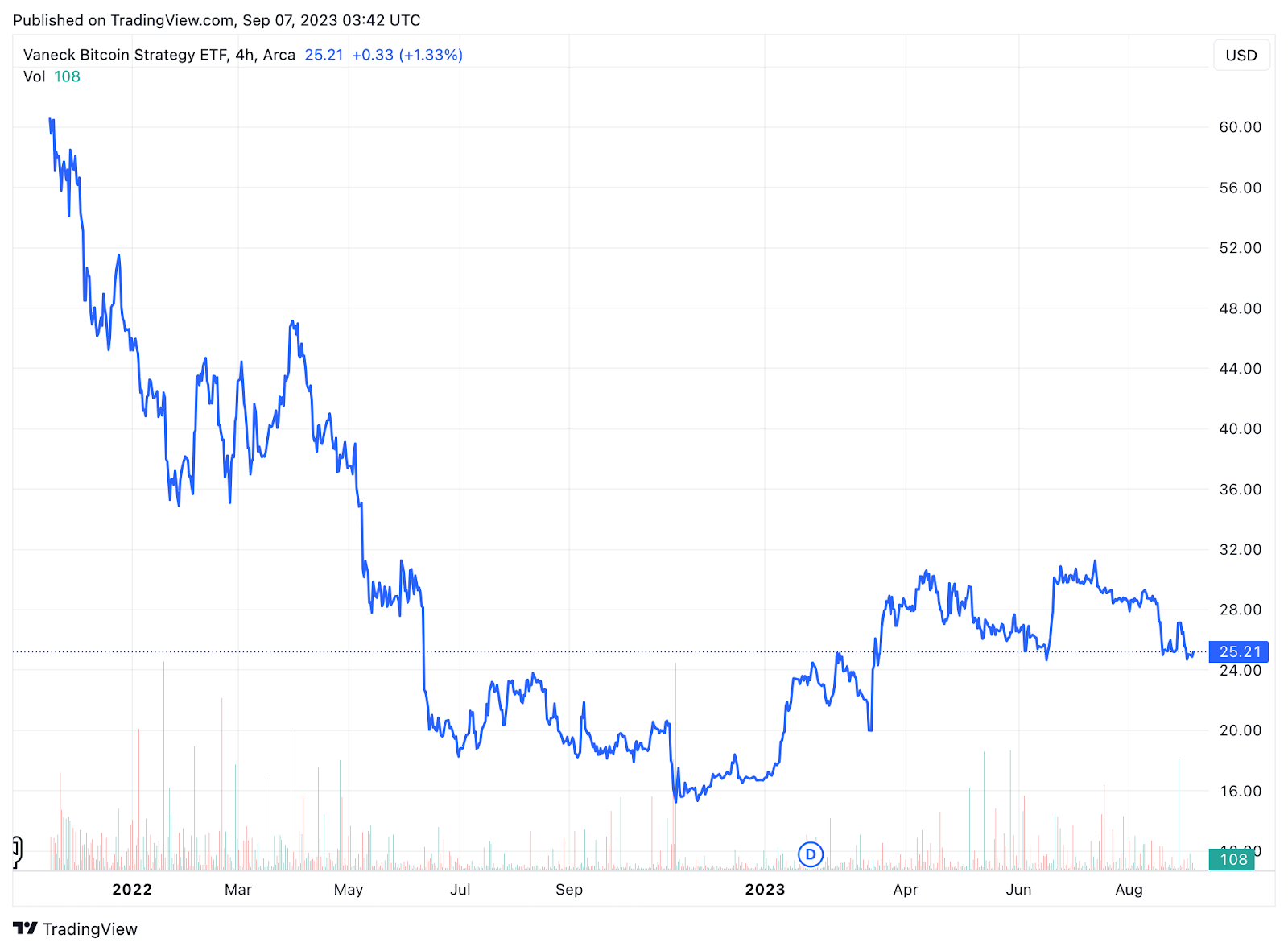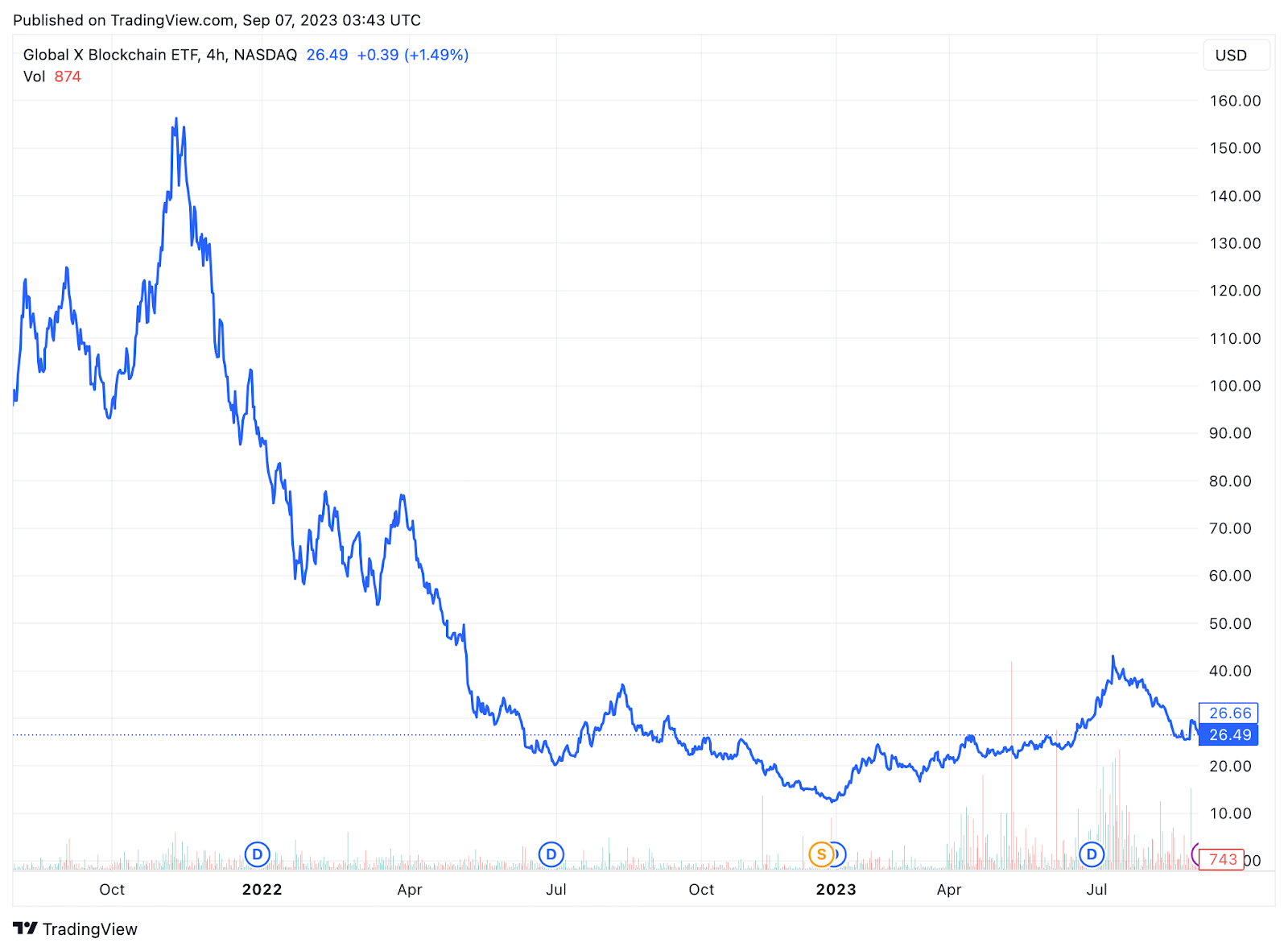Download the YouHodler app
Try our platformNavigating the World of Crypto ETFs: Finding the Best Crypto ETF for Your Portfolio

Download the YouHodler app
Cryptocurrency ETFs, or exchange-traded funds, are growing in popularity. Beginner and expert traders alike are considering adding crypto ETFs to their investment portfolios. They can enjoy the versatile benefits of an ETF that tracks one or more crypto prices. Of course, just how successful a crypto ETF is for an investor depends on its characteristics.
Selecting the best ETF for your crypto portfolio is crucial in reaping its rewards. The wrong ETF won’t mesh with your financial goals or support your investment strategy, causing major losses. In this article, we’ll provide you with valuable insights into the crypto ETF market. Walk through these pivotal ETF features as you determine which choice works best to boost your crypto profits.
Understanding Crypto ETFs: What is a Crypto ETF?
A crypto ETF or exchange-traded fund is a type of investment security that tracks a specific crypto, or set of cryptocurrencies. ETFs have historically tracked the prices of many different assets, from cryptos to commodities. This means traders can expect their ETFs to fluctuate on a daily basis, influenced by sales and purchases in the market.
Traders can buy or sell ETFs on a daily basis if they want, or hold it long-term. Crypto investment firms will put together and manage ETFs for investors to buy. There are two main types of crypto ETFs. An investment firm might buy crypto and represent ownership of the digital assets as shares to back the ETF.
Benefits of crypto ETFs
In this way, investors indirectly buy the cryptocurrency as well. Investors can avoid the risk of personally owning crypto, which is a key benefit of this kind of crypto ETF. Other crypto ETFs might track crypto futures contracts or other exchange-traded products. In this type of ETF, investors are tracking other traders’ bets on future crypto prices.
Using either type of crypto ETF gives traders the advantage of gaining exposure to these digital assets. They can simultaneously avoid extra charges, like digital wallet fees. Another advantage is security - sometimes, digital wallets, crypto accounts, or even exchanges are hacked. With ETFs, tight security is provided by the firms that manage them. ETFs are also very accessible to traders, allowing them to bypass complicated crypto jargon and act as a more affordable option.
Potential Risks of ETFs
Of course, ETFs also pose certain risks. ETFs sometimes aren’t as transparent as owning crypto outright. The third-party investment firm may not provide accurate and detailed information about their operations. ETFs are also not as liquid as actual cryptos - meaning it’s harder to turn them into cash.
Suggested reading: Market Liquidity (What is it and how to measure it?)
The Best Crypto ETFs for Your Portfolio
Research and Due Diligence
It’s crucial to find reputable ETF providers to keep your investments secure. There are many options available for traders to choose from. Before a firm can provide crypto ETFs, they have to submit an application to the SEC (U.S. Securities and Exchange Commission). The agency is very strict with its approvals for crypto ETFs. They’ve denied many applications for reasons such as low liquidity and potential market manipulation.
However, cryptocurrencies are becoming more mainstream and the public is embracing digital assets. With this, SEC and investors alike are more open to ETFs. Research ETF providers that have a stable and transparent historical performance. Ensure that they’re open about their regulatory status with the SEC.
Factors to Consider When Choosing a Crypto ETF
There are multiple factors to consider when buying a crypto ETF.
- Financial Strategy: First, consider your time frame, financial goals, and which assets you’re interested in.
- Assets: Search for ETFs that track one (or more) of the cryptos you want to gain exposure to. This might be Bitcoin, Ethereum, or altcoins.
- Expenses: Check the ETF’s expense ratio as well. This is the percentage of the ETF fund that is deducted annually for fees.
- Trading Volume: Your ETF’s liquidity and trading volume is also important. If there’s a bigger demand, you’ll benefit from higher liquidity and potential gains.
- Security Arrangements: How does custody for your ETF work? Will the provider act as a custodian, or are you able to access its trust at any time?
- Regulatory Compliance: Ensure that your ETF provider is open and honest about its regulatory status.
Top Performers in the Crypto ETF Space
Let’s examine some of the most notable crypto ETFs in the market at the time of writing.
VanEck Bitcoin Strategy ETF (XBTF)

VanEck is a major player in crypto ETFs, with this particular ETF focused on Bitcoin futures. Launched in 2021, this actively managed ETF uses US Treasuries as collateral. It has around $47 million under management and a low expense ratio of just 0.66%. It trades at $24.92, currently.
Global X Blockchain ETF (BKCH)

This ETF launched in 2021 tracks a market-cap-weighted index of multiple companies involved in blockchain technology and crypto. These include Coinbase, Marathon Digital Holdings, and Hut 8 Mining Corporation. With nearly $61 million in assets under management, the ETF is trading at $26.72. Its expense ratio is very affordable, at just 0.50%.
ARK Next Generation Internet ETF (ARKW)

ARK is an actively managed ETF with holdings in a broader range of digital asset companies. Though it has a large holding in Coinbase (17.9%), it also provides exposure to other Web3 tech. This includes cloud computing, AI, and cybersecurity. It holds a net asset value of $58.84 and a YTD NAV return of 74%. However, the ETF has a higher expense ratio of 0.88%.
Strategies for Incorporating Crypto ETFs into Your Portfolio
- Diversification: Use your crypto ETFs to diversify your portfolio, gaining exposure to multiple types of assets. Dividing your funds amongst multiple ETFs can improve your chances of turning a larger profit.
- Allocation: An allocation strategy is done by distributing assets or equity to a specific entity. That entity, whether they’re another investor or an organization, can earn, buy, or save the assets. You can allocate your crypto ETF based on their market capitalization, and use it for passive earnings.
- Risk management and hedging: Crypto ETFs can function as a cost-effective method of hedging, or reducing price risk. This is especially helpful for smaller investors, who might not afford to buy crypto or other assets outright.
Tips for Investing in a Crypto ETF
- Set clear investment goals: Determine your financial plan, and how a crypto ETF will support it. For example, ETFs based on crypto futures better suit a short-term strategy, as they have an expiration date. Likewise, if you have the objective of gaining exposure to a specific asset, make sure your ETF has a majority holding in that asset.
- Stay informed about the cryptocurrency market: While you aren’t buying crypto outright, it’s important to keep updated on what’s happening in the market. Cryptocurrency prices are often influenced by market sentiments, new launches, or global events, which will impact your ETFs.
- Regularly review and re-balance your portfolio: Many ETFs are great options for long-term, passive investment. However, this doesn’t mean you can forget about them for months or years at a time. Ensure that you regularly analyze how your ETFs are performing, and if they’re still aligned with your goals.
Conclusion: What are the best Crypto ETFs?
Crypto ETFs are an incredible option to add to modern investment portfolios. They provide exposure to cryptocurrencies and related blockchain technologies to new and veteran traders alike.
They’re also a great way to diversify your portfolio and step into buying and managing ETFs is also largely passive, freeing investors up for other activities. Before diving into the world of crypto ETFs, explore and compare the top performers that appeal to you. If you read about the assets your ETF tracks, and how they’ve performed since their inception, you’ll successfully navigate the world of crypto ETFs.
faq quetstion
.svg)
Suggested Posts



YouHodler is regulated in Switzerland, the EU and Argentina.
YouHodler SA
Registered financial intermediary
YouHodler Italy S.R.L.
VASP registered at OAM / MICAR
YouHodler SA
Registered as VASP with Banco de España
YouHodler SA Branch in Argentina.
Registered as a VASP with the CNV.





.jpg)
.jpg)
.jpg)
